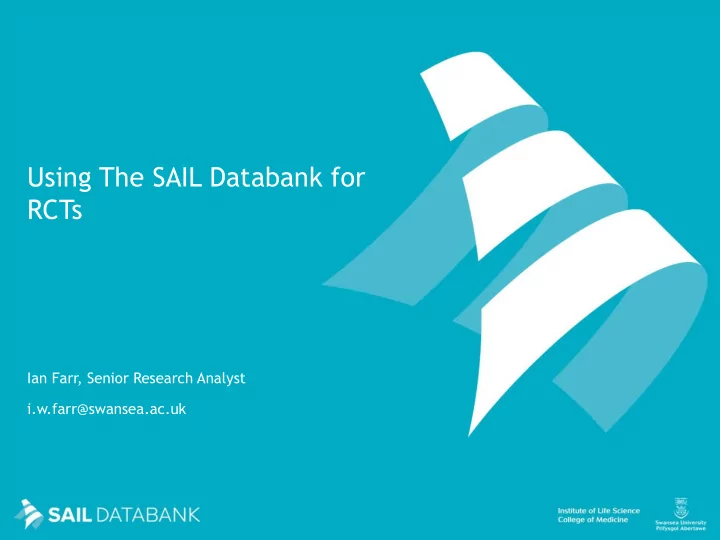

Using The SAIL Databank for RCTs Ian Farr, Senior Research Analyst i.w.farr@swansea.ac.uk
SAIL Databank Overview • SAIL = Secure Anonymised Information Linkage • Established 2006 • Swansea University • Work closely with NHS • Datasets: • Health • Demographics • Social • Disease specific
SAIL Databank Overview Welsh population-based data 5,000,000 10,000,000,000 Pop. 3,000,000 UK-Wide Collaborations • Health Data Research UK • Administrative Data Research Network
Some Key Linkable Datasets Held by SAIL Health Demographic Social ONS Education Inpatient Admissions Births Disease Outpatient Deaths Attendances Specific Welsh Disease Deprivation Demographic GP Indices Registers Service National Community Emergency Screening Services Child Health Database Dept
Data Coverage • Population Coverage Most datasets: Welsh population coverage • GP dataset: partial • Practices are data owners, so each must sign up. • In SAIL currently: 77% practices covered = 79% population • coverage • Optional cleaning algorithms to identify record and patient sets e.g. https://journals.plos.org/plosone/article?id=10.1371/jo urnal.pone.0228545 Time span • Inpatient: 1999- (with ICD10 coding) • Outpatient: 2003- • GP: varies by practice (plenty of data 2000-) • A&E: 2009- • • Updates • Most core datasets quarterly. A few datasets have a time lag at source. •
Governance • Anonymisation of data by trusted third party. • Where no NHS number then probability matching applied to derive Anonymised Linking Field (ALF) and there is a field so it is apparent this has been done • Independent Information Governance Review Panel (IGRP) considers all applications to use data • Single application to access all SAIL datasets. • Projects given access to encrypted extract of the data. • Work carried out in secure remote desktop environment. • Review of all outputs before release.
Split file process of anonymisation
The Journey of a SAIL Project Data Loading Information Scoping Project Active Governance Review and Preparation • Feasibility • Independent Panel • Anonymisation • Project team gets and loading of access • Refine Idea • Appropriateness project datasets of topic • Conduct Analysis • Determine Cost of (if any) SAIL Support • Sensitive issues • Export Results • Creation of data extract
Who Can Work with SAIL? • A wide variety of users • Academic • NHS • Government • Commercial • Must be legitimate research with potential for public benefit. • Cannot be used for performance management (e.g. league tables of hospital performance). • Pharmaceutical companies cannot access data directly; work must be done by SAIL or another independent partner.
Types of Research: Observational Studies • Purely based on data held in SAIL. • EUROmediCAT: the safety of medication in pregnancy • Identifying risk factors for Suicide and Self-Harm Contributes to https://adolescentmentalhealth.uk/ • Importing a cohort of patients and linking to SAIL. • Type 1 diabetes and hospital admissions, linking a diabetes register to SAIL. • Deriving code lists validated from disease registers • E.g. https://www.hdruk.ac.uk/resources/external-validation-of- the-electronic-frailty-index-using-the-population-of-wales-within- the-secure-anonymised-information-linkage-databank/
Types of Research: Service Evaluation • Air AWARE • Did an air quality monitoring and alert system in Port Talbot lead to better health outcomes? • Housing programmes • Do programmes such as a home energy efficiency intervention improve health?
Types of Research: Supporting Health Providers • Goal: work more closely with NHS to increase the benefit of SAIL. • Small Business Research Initiative with ABMU • GP Engagement Project • Research supporting GPs in focus areas. • Custom reports sent to each practice showing results related to their own practice.
Types of Research: Clinical Trials • Supplemental Data • Replacing survey data for things like participants’ health, health economics, service usage. • Extended Outcomes • PROBAT , study of probiotic supplements in infancy. • Extra years of follow-up using routine data. Trial Feasibility • Potential for easily determining whether patients • exist for a clinical trial.
SAIL Support and Costs No charge for data or basic service • Project-specific support costs only • Different Levels of Support • Providing the data only • Collaborating on analysis • No charge if the Information Governance • Review Panel application is not successful Based on three types of projects • Academic • NHS • Commercial •
Thank You Any questions? More info: www.saildatabank.com saildatabank@swansea.ac.uk
Recommend
More recommend